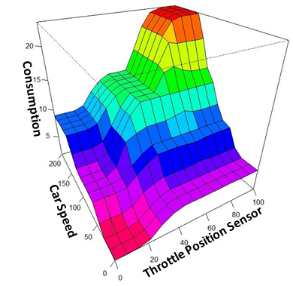A Fuzzy Logic Module to Estimate a Driver’s Fuel Consumption for Reality-Enhanced Serious Games
DOI:
https://doi.org/10.17083/ijsg.v5i4.266Keywords:
Serious game, Reality-enhanced games, Fuel consumption, Fuzzy Logic, On-Board Diagnostics-II (OBD-II)Abstract
Reality-enhanced gaming is an emerging serious game genre, that could contextualize a game within its real instruction-target environment. A key module for such games is the evaluator, that senses a user performance and provides consequent input to the game. In this project, we have explored an application in the automotive field, estimating driver performance in terms of fuel consumption, based on three key vehicular signals, that are directly controllable by the driver: throttle position sensor (TPS), engine rotation speed (RPM) and car speed. We focused on Fuzzy Logic, given its ability to embody expert knowledge and deal with incomplete information availability. The fuzzy models – that we iteratively defined based on literature expertise and data analysis – can be easily plugged into a reality-enhanced gaming architecture. We studied four models with all the possible combinations of the chosen variables (TPS and RPM; RPM and speed; TPS and speed; TPS, speed and RPM). Input data were taken from the enviroCar database, and our fuel consumption predictions compared with their estimated values. Results indicate that the model with the three inputs outperforms the other models giving a higher coefficient of determination (R2), and lower error. Our study also shows that RPM is the most important fuel consumption predictor, followed by TPS and speed.

Downloads
Published
Issue
Section
License
Copyright (c) 2018 Rana Massoud, Stefan Poslad, Francesco Bellotti, Riccardo Berta, Kamyar Mehran, Alessandro De Gloria

This work is licensed under a Creative Commons Attribution-NonCommercial-NoDerivatives 4.0 International License.
IJSG copyright information is provided here.